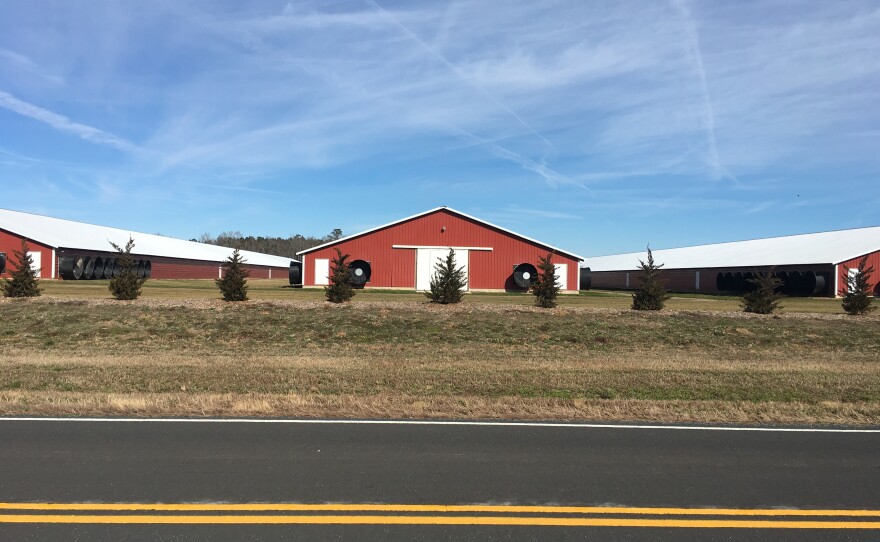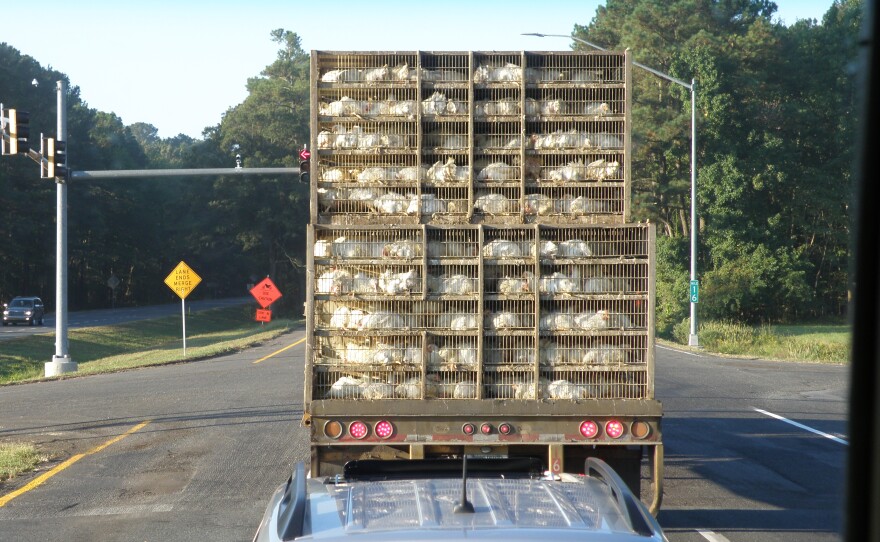Big poultry on the DelMarVa Peninsula began by accident when homemaker Cecile Steele was shipped 500 chicks to raise instead of the 50 she ordered. She kept them, made a profit and ordered a thousand the next year. And so, an industry was born and has been growing ever since.
But the hundreds of thousands of tons of manure produced each year so close to the Chesapeake Bay worries residents of Virginia's Eastern Shore.
Perhaps surprisingly, a chicken house full of 30,000 birds ready for processing doesn't actually smell that bad. Every so often one of about 20 giant fans switches on drying out nine weeks worth of manure. Outside there are clusters of the 600-foot-long, state-of-the-art, barn-red buildings. Each takes up nearly an acre.
But it's what you can't see that worries some neighbors like Sue Mastyl of Citizens for a Better Eastern Shore. She wants more oversight from Virginia's Department of Environmental Quality. "As far as actually measuring water quality issues and air quality issues, DEQ, with the permits that these poultry operations currently have, assumes that there is no pollution, therefore there's nothing to measure."
Virginia produces about 700,000 tons of poultry manure each year. Accomock County produces 150,000 tons. That's about 7,500 dump truck loads.
Back in 2010, the EPA found three Eastern Shore poultry farmers violating the federal Clean Water Act. Now, Virginia is proposing a new permit to require more boots-on-the-ground monitoring for some farms. It includes some quarterly inspections and stormwater discharge sampling.

Mastyl and others who attended a recent public hearing on the draft permit complained the sampling uses no science and doesn't go far enough. "The measurement is for the farmer to get a glass of water, look at it, smell it and send in a report," Mastyl said.
Ask any commercial farmer and they'll tell you about their piles of paperwork to comply with federal and state regulations and tens of thousands of dollars in stormwater management. Several took offense at the hearing including Mark McCready, a lifelong poultry farmer. "I have to send manure samples off to the University of North Carolina State every year. I just went through about four or five weeks ago, a DEQ full audit," McCready said. "They came to the farm. They inspected everything. They inspected the grounds, the manure shed, make sure of the manure storage and all of my documentation. I have all of my documentation from five years ago, where the manure went, how it went, how much, all of it."
Residents are also concerned about ammonia sucked out by the giant fans. McCready says that's a misconception. "Ammonia levels, when I was a little boy, would knock you down, if you went into the chicken house," McCready remembered. "Now, if you've got 15 parts per million, poultry welfare law states, you better be doing something, you're not doing something right."

Still, Accomack and Northampton counties have already tightened zoning regulations, limiting the number of houses per acre and requiring larger setbacks. Last month, the tiny 395 acre town of Painter approved zoning regulations stricter than Accomack County, basically squeezing out any plan for industrial-sized poultry houses.
The state's lucrative aquaculture industry is also paying close attention. Dick Snyder is a scientist who works at the Virginia Institute of Marine Science Eastern Shore lab. He's part of The Delmarva Land & Litter Challenge, a multi-state task force of environmental, academic, governmental, and agricultural communities determining limits to spreading poultry manure for fertilizer on the peninsula. "I think we just owe it to the Eastern Shore and the community and the state to find out if the regulations being used are adequate to protect water quality," Snyder said. "And from where I sit here at this marine lab, here at the birthplace of the clam industry, I owe it to aquaculture to make sure that chicken houses are not going to adversely affect aquaculture on the Eastern Shore of Virginia."
The task force plans to release its findings later this year. DEQ officials said farms that are in close proximity to a creek or river would more likely fall under the proposed draft permit and it could have a statewide effect.
This report, provided by Virginia Public Radio, was made possible with support from the Virginia Education Association.




